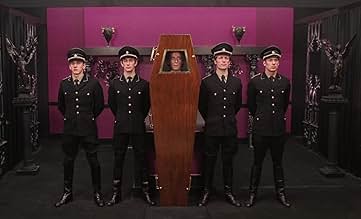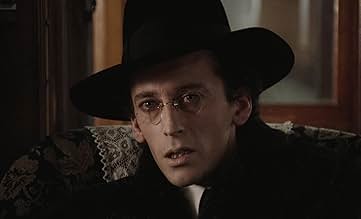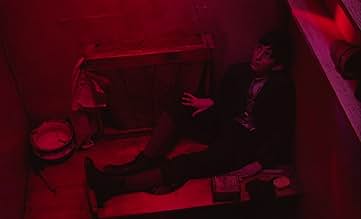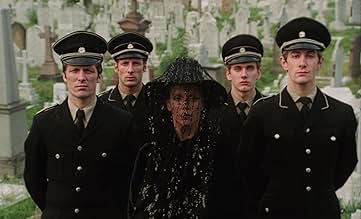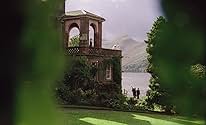Mahler
- 1974
- Tous publics
- 1h 55min
NOTE IMDb
7,0/10
3,3 k
MA NOTE
La vie du compositeur Gustav Mahler, racontée dans une série de flashbacks alors que lui et sa femme discutent de leur mariage raté lors d'un voyage en train.La vie du compositeur Gustav Mahler, racontée dans une série de flashbacks alors que lui et sa femme discutent de leur mariage raté lors d'un voyage en train.La vie du compositeur Gustav Mahler, racontée dans une série de flashbacks alors que lui et sa femme discutent de leur mariage raté lors d'un voyage en train.
- Victoire aux 1 BAFTA Award
- 3 victoires et 1 nomination au total
Avis à la une
Yes, you had to have developed an appetite for Ken Russell's visions. Mahler works beautifully for me. I happen to like Mahler's music and historically, Russell, captures the juice of this man's genius.
Russell moves behind the music, into the skin of Mahler, his wife, Alma, and the tragic circumstances that surround them.
Mahler would have smiled when experiencing Russell's image of him. Thomas Mann's book, Death in Venice, is about Mahler, and Russell includes the railroad station scene, with the young boy and the business man, courting a bit, and then the camera, goes to Mahler, who understands whats going on here, and smiles, in amusement. Clever touch for Russell, but is most likely lost on the general audience. Not to say Mahler liked little boys, but his sexual orientation was ambiguous, at best.
Alma was like that, and the officer, whom she was having an affair, was most likely that way? Mahler went to see Freud over this affair in reality. Russell always takes us inside the psychological drama and visualizes, the inner Hell, Mahler feared regarding his wife and his coming death.
Alma had affairs after Mahler's death, and was a star f...ER, and had marriages and affairs with Europe's most brilliant geniuses, for real. She loved bright men, but loved herself, the most, I think? Later Erich Wolfgang Korngold, wrote a violin concerto for her, in Hollywood.
The film's tracking of the creative process regarding the music, is most likely right on, though the little composing hut, was not on the lake shore, but on a hill top, overlooking the lake.
Over all the film is historically correct, and emotionally, shows it as it most likely was for them as a famous couple. Alma did harbor jealousy, and stopped composing her music. Of late a CD has been released of her music and her music is acceptable, but pales compared to her husband's giant compositions.
I would have liked for Russell to include Richard Strauss's music, and their personal friendship. Both composers often talked about their troubles with their music and their wives. Strauss and Mahler are often similar in their musical genius, and understood each other's vision musically. It would have been nice to have the two together more in this film's history.
You have to have a taste for Mahler and Russell, to really get the humor and the brilliance that lies just beneath of surface. At least, Mahler, did not turn out to be another TOMMY...ha Bravo to Ken Russell and I am so glad he came along in my life time. Cast was perfect as well.
Russell moves behind the music, into the skin of Mahler, his wife, Alma, and the tragic circumstances that surround them.
Mahler would have smiled when experiencing Russell's image of him. Thomas Mann's book, Death in Venice, is about Mahler, and Russell includes the railroad station scene, with the young boy and the business man, courting a bit, and then the camera, goes to Mahler, who understands whats going on here, and smiles, in amusement. Clever touch for Russell, but is most likely lost on the general audience. Not to say Mahler liked little boys, but his sexual orientation was ambiguous, at best.
Alma was like that, and the officer, whom she was having an affair, was most likely that way? Mahler went to see Freud over this affair in reality. Russell always takes us inside the psychological drama and visualizes, the inner Hell, Mahler feared regarding his wife and his coming death.
Alma had affairs after Mahler's death, and was a star f...ER, and had marriages and affairs with Europe's most brilliant geniuses, for real. She loved bright men, but loved herself, the most, I think? Later Erich Wolfgang Korngold, wrote a violin concerto for her, in Hollywood.
The film's tracking of the creative process regarding the music, is most likely right on, though the little composing hut, was not on the lake shore, but on a hill top, overlooking the lake.
Over all the film is historically correct, and emotionally, shows it as it most likely was for them as a famous couple. Alma did harbor jealousy, and stopped composing her music. Of late a CD has been released of her music and her music is acceptable, but pales compared to her husband's giant compositions.
I would have liked for Russell to include Richard Strauss's music, and their personal friendship. Both composers often talked about their troubles with their music and their wives. Strauss and Mahler are often similar in their musical genius, and understood each other's vision musically. It would have been nice to have the two together more in this film's history.
You have to have a taste for Mahler and Russell, to really get the humor and the brilliance that lies just beneath of surface. At least, Mahler, did not turn out to be another TOMMY...ha Bravo to Ken Russell and I am so glad he came along in my life time. Cast was perfect as well.
Ken Russell made several films for the BBC on artists and musicians like Fredrick Delius, the composer, and Dante Gabriel Rossetti, the painter and poet, and one of the founders of the Pre Raphaelite movement. The Rossetti film features the late Oliver Reed in an engrossing performance. This Mahler film is quite good. I feared watching it because I thought Ken Russell would make a circus of Mahler's tempestuous life, but it's a fairly controlled foray, except for the aforementioned sequence with Wagner's widow, BUT she was well acquainted with Hitler, and she never met a Nazi she didn't like, so the scene with her was founded on fact.
Robert Powell, and the lovely Georgina Hale, give beautiful performances. I looked in their credits and see THEY ARE BARELY WORKING TODAY. Maybe their own choice or a preference of stage work. I can't believe they would pass up today's movie money. They have not appeared as far as I can see in any major movie project for years. I don't get it. Russell, if he worked with the editor fitting the music to the film, shows a real feeling for the music. Even today Mahler's music is a specially acquired taste, and if much of it sounds bizzaire today, think what it sounded like to listners in 1906. A special kudo must go to David Collings as the insane composer Hugo Wolf. An acting gem. Also no current acting credits. David where are you? We need guys like you, Robert Powell, and Georgina Hale.
Robert Powell, and the lovely Georgina Hale, give beautiful performances. I looked in their credits and see THEY ARE BARELY WORKING TODAY. Maybe their own choice or a preference of stage work. I can't believe they would pass up today's movie money. They have not appeared as far as I can see in any major movie project for years. I don't get it. Russell, if he worked with the editor fitting the music to the film, shows a real feeling for the music. Even today Mahler's music is a specially acquired taste, and if much of it sounds bizzaire today, think what it sounded like to listners in 1906. A special kudo must go to David Collings as the insane composer Hugo Wolf. An acting gem. Also no current acting credits. David where are you? We need guys like you, Robert Powell, and Georgina Hale.
Ken Russell's composer biographies hit their apex with his stylized take on Tchaikovsky in "The Music Lovers." Three years later, Russell began his descent with "Mahler." Structured as a series of flashbacks, it may be hard to follow for anyone unfamiliar with the events and chronology of Mahler's life. The conversion sequence sets a new standard for poor taste, even for Russell. Robert Powell gives a fine performance, aided by a close resemblance to the real deal. Georgina Hale failed to make an impression in her appearance in Russell's "The Boy Friend," and is tentative, at best, here in a leading role as wife Alma. Antonia Ellis, another alumna of "The Boy Friend" is game for anything Russell throws at her. Even with a taste for the Russell treatment, "Mahler" may be a little hard to swallow.
Like Tchaicovksy before him composer Gustav Mahler gets cuffed about in grand fashion in this bio on his life by Ken Russell. Russell as usual pulls no punches while landing some low blows in this brilliantly sardonic take on the composer conductor's life and career.
Gustav Mahler ( Robert Powell ) ill but unaware he' ll be dead within a year rides exhausted aboard a train across the Eurpeon landscape with his wife whose looking to get off at the next stop with a lover. In the depths of despair he reflects upon his past; a brutal father, a brothers suicide, a death of a child infidelity , religious conversion to attain status as well as the immediate problem of holding onto his wife.
Such downward spiral tragedy is prime Bergman territory but in the hands of Infant Terrible Russell it is a wild, irreverent , dark humored ride down the tracks accompanied by the composers magnificent writings both skillfully and comically matched to imagery and situation. Cosima Wagner as a Brunhilde Nazi, the impoverished siblings as the Marx Brothers, the sacrilegious conversion rite intermixed with scenes of pastoral beauty that inspired him unfold at a rapid and provocative tempo.
Powell is a dead ringer for the composer and he does a commendable job of conveying his ego, cynicism and vulnerability huddled in his exclusive passenger car. It is Russell's jaundice and vivid interpretation though that will leave the viewer mesmerized or revolted. With Ken's films there is no in between.
Gustav Mahler ( Robert Powell ) ill but unaware he' ll be dead within a year rides exhausted aboard a train across the Eurpeon landscape with his wife whose looking to get off at the next stop with a lover. In the depths of despair he reflects upon his past; a brutal father, a brothers suicide, a death of a child infidelity , religious conversion to attain status as well as the immediate problem of holding onto his wife.
Such downward spiral tragedy is prime Bergman territory but in the hands of Infant Terrible Russell it is a wild, irreverent , dark humored ride down the tracks accompanied by the composers magnificent writings both skillfully and comically matched to imagery and situation. Cosima Wagner as a Brunhilde Nazi, the impoverished siblings as the Marx Brothers, the sacrilegious conversion rite intermixed with scenes of pastoral beauty that inspired him unfold at a rapid and provocative tempo.
Powell is a dead ringer for the composer and he does a commendable job of conveying his ego, cynicism and vulnerability huddled in his exclusive passenger car. It is Russell's jaundice and vivid interpretation though that will leave the viewer mesmerized or revolted. With Ken's films there is no in between.
If you are in the camp of liking Ken Russell, you are going to love this movie. If you like Mahler's compositions and think you're going to get a straightforward biopic (more on this later), you're in the wrong place.
This film is beautifully shot, the acting is over the top in many cases, the imagery will at times be disturbing, the metaphors will run deep, like all Russell's movies.
I just heard of Georgina Hale's passing in January of this year (2024) so was drawn to watch this film again because she was fantastic. I know she won a BAFTA for it, but she should have been given more recognition outside of the UK for this role.
I want to return to the term "straightforward biopic" now. By that I mean the cookie cutter, sanitized tripe that moviegoers normally eat up like Bohemian Rhapsody, Rocket Man, A Beautiful Mind, etc., that take real people who had very interesting lives and then manipulate, fabricate, and distort to give us our feels but no substance. You're better off just watching a documentary in most cases.
If you're going to do a biopic, I say go all in like Ken Russell does. While you may get his version of the story, at least you're going to be in for a beautiful and wild ride that will also make you think.
This film is beautifully shot, the acting is over the top in many cases, the imagery will at times be disturbing, the metaphors will run deep, like all Russell's movies.
I just heard of Georgina Hale's passing in January of this year (2024) so was drawn to watch this film again because she was fantastic. I know she won a BAFTA for it, but she should have been given more recognition outside of the UK for this role.
I want to return to the term "straightforward biopic" now. By that I mean the cookie cutter, sanitized tripe that moviegoers normally eat up like Bohemian Rhapsody, Rocket Man, A Beautiful Mind, etc., that take real people who had very interesting lives and then manipulate, fabricate, and distort to give us our feels but no substance. You're better off just watching a documentary in most cases.
If you're going to do a biopic, I say go all in like Ken Russell does. While you may get his version of the story, at least you're going to be in for a beautiful and wild ride that will also make you think.
Le saviez-vous
- AnecdotesKen Russell was inspired to make his film about composer Gustav Mahler after greatly disliking Mort à Venise (1971). In a segment of his autobiography about this film, Russell said that he thought that the other "so-called Mahler film," "Death in Venice," was rubbish. "People think it's about Mahler, all because his music is part of the soundtrack! The director, Luchino Visconti, never said it was about him, though." So he mocked the film in his movie. He had a satirical moment when Mahler looks out of the train and sees his dying lookalike. In Visconti's movie, the young actor playing Tadzio was 15, but in this film, as in Thomas Mann's book, the boy being ogled is only a child.
- GaffesWhen Mahler's train leaves St. Pölten, a sign is visible identifying the town as "Saint Pölten". Yet, the German long script for the town is "Sankt Pölten".
- Citations
[last lines]
Gustav Mahler: [reminded of some medications he should take] They won't be needed! We're going to live forever!
- ConnexionsFeatured in A British Picture (1989)
- Bandes originalesIn Stormy Weather
Sung by Carol Mudie
Performed by The National Philharmonia Orchestra
Conducted by John Forsyth
Meilleurs choix
Connectez-vous pour évaluer et suivre la liste de favoris afin de recevoir des recommandations personnalisées
- How long is Mahler?Alimenté par Alexa
Détails
- Date de sortie
- Pays d’origine
- Langues
- Aussi connu sous le nom de
- Mahler, una sombra en el pasado
- Lieux de tournage
- Sociétés de production
- Voir plus de crédits d'entreprise sur IMDbPro
Contribuer à cette page
Suggérer une modification ou ajouter du contenu manquant


